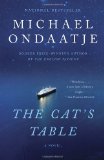Summary | Excerpt | Reviews | Beyond the book | Read-Alikes | Genres & Themes | Author Bio

A Tale of Adventure
by Michael ChabonThe word "swashbuckling" was
invented for this novel. In antique, jewel-toned
words ("bambakion," "buskin, "bodkin") and sentences
as meandering and adventuresome as the plot itself,
Gentlemen of the Road gallops after Amram and
Zelikman, a mismatched pair of fortune-hunters in
tenth-century Khazaria. They are far from your
average adventurers—Amram is an Abyssinian who looks
like a thug, carries a Viking ax named
Mother-Defiler, and behaves like royalty, and
Zelikman is a moody, ascetic German Jew with an
abiding affection only for his horse. Their
small-time swindles take a turn for the
extraordinary when a foundling they've been
conscripted to deliver to distant relatives turns
out to be an orphaned prince bent on revenging his
father's death and restoring his own claim to the
throne. Game for anything, Amram and Zelikman pledge
their services to the dubious cause. As their
nemesis exclaims admiringly, "Gentlemen of the road,
hustling a kingdom!"
You can learn much about the novel by listening to
the stately irony of that title phrase. Zelikman
defines a gentleman of the road as "an apostate from
the faith of my fathers, a renegade, a brigand, a
hired blade, a thief," yet he and his comrades
address each other in florid turns of phrases with
all the gravity of courtiers. They even abide by a
code of ethics, distinguishing their brand of
nefariousness from the far worse practice of
soldiering. Zelikman explains disdainfully, "I want
nothing to do with soldiers, armies, chains of
command. All the evil in the world derives from the
actions of men acting in a mass against other masses
of men." Zelikman, who is estranged from his father,
and Amram, who travels across the globe in a phantom
search for his dead daughter, are mournfully aware
of their low station in life. Chabon grants them an
articulateness about their exile that sharply
contrasts with their dastardly deeds. This, in my
opinion, is Chabon's signature contribution to
contemporary literature, what distinguishes him from
the likes of Jonathan Franzen and Dave Eggers: his
unwavering affection for and generosity toward his
own characters, which leads him to see their
integrity even in their moments of greatest frailty.
I was initially skeptical about Gentlemen of the
Road because it appeared so swiftly after
Chabon's ambitious novel, The Yiddish Policeman's
Union, and because it was first serialized in
the New York Times Magazine. The book styles itself
as a boy's adventure novel, complete with
illustrations by Gary Gianni and the coy captions of
the genre ("He turned it over and ran his fingers
along the runes. I wonder what they say."). Would
the story be too slight, too ad hoc, too genre-bound
to stand up to his major works? But I should have
known better than to doubt. The Amazing
Adventures of Kavalier and Clay, without a doubt
Chabon's best work to date, proved that his unit of
composition is the chapter. In that work, as in
Gentlemen of the Road, each one ends with a
virtuosic flourish of the pen—a moment of exquisite
suspense, a satisfying one-liner, a tiny release of
narrative tension. In this way, Chabon is as
generous to his readers as he is to his characters.
Gentlemen of the Road is undiluted pleasure.
The book's only misstep is its afterword, in which
Chabon disingenuously attempts to justify a literary
author's decision to write an adventure novel, what
he calls "the incongruity of writer and work."
Surely Chabon knows he need not apologize for his
foray into genre work, because he has already
established a reputation as a serious author who
turns the dross of popular culture—comics, detective
novels—into gold. Gentlemen of the Road is
not a major novel. But Chabon clearly had fun
writing it, and that is enough to ensure the reader
will enjoy gulping it down. With its beguiling prose
and exotic setting, it is a first-rate yarn; with
the deep humanity of its protagonists, it is a
demonstration of a master storyteller investing the
world with his own.
![]() This review was originally published in The BookBrowse Review in November 2007, and has been updated for the
October 2008 edition.
Click here to go to this issue.
This review was originally published in The BookBrowse Review in November 2007, and has been updated for the
October 2008 edition.
Click here to go to this issue.

If you liked Gentlemen of the Road, try these:

by Michael Ondaatje
Published 2012
A spellbinding story - by turns poignant and electrifying - about the magical, often forbidden, discoveries of childhood and a lifelong journey that begins unexpectedly with a spectacular sea voyage.

The Thousand Autumns of Jacob de Zoet
by David Mitchell
Published 2011
A magnificent mix of luminous writing, prodigious research, and heedless imagination, The Thousand Autumns of Jacob de Zoet is the most impressive achievement of its eminent author.
Your guide toexceptional books
BookBrowse seeks out and recommends the best in contemporary fiction and nonfiction—books that not only engage and entertain but also deepen our understanding of ourselves and the world around us.